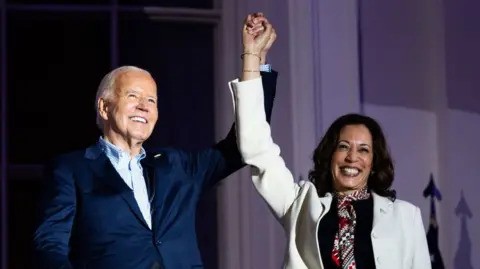As Democratic presidential hopeful Kamala Harris vets potential running mates, spare a thought for the contenders as they undergo a process that one past participant likens to "a colonoscopy performed with a telescope”.
Have you ever paid for sex?
Have you ever paid for an abortion?
Have you ever had a homosexual encounter?
This is just some of the material in questionnaires fired off during the exhaustive vetting process for previous US vice-presidential nominees.
Potential partners to join Ms Harris on the Democratic ticket for November's election will have to answer up to 200 questions before they can even begin to be seriously considered.
The vetters - campaign officials and lawyers who volunteer their billable hours for the networking and prestige - often have about a month to dig up every grain of dirt they can find.
The Harris campaign has a matter of days to pick a running mate, with a paperwork deadline looming. The vice-president, who went through the process herself only four years ago, has been assessing around a dozen contenders, with Governor Josh Shapiro and Senator Mark Kelly among those being touted.
Pete Buttigieg, who is also among the rumoured potential picks, was asked this week if the possible running mates are aware they are being vetted. "Yeah, you know," he said with a smile.
What makes the whole undertaking especially challenging is that, unlike with cabinet picks, the FBI does not perform background checks on vice-presidents.
The vetters will pore over a contender’s tax returns and medical history. They may log on to his or her private social media accounts. They will scour the social media posts of his or her children. The grandchildren’s, too.
The least suggestion of marital infidelity, or any other skeleton in the closet, will be picked apart.
They will check every record of every word the potential candidate has ever uttered or written.
Jim Hamilton, a Democratic lawyer who evaluated potential running mates for John Kerry, Barack Obama and Hillary Clinton, told the BBC that notes of the process are destroyed afterwards to preserve “a strict, strict veil of confidentiality”.
He oversaw more than 200 lawyers who were tasked with finding Mrs Clinton’s running mate (she picked Virginia Senator Tim Kaine).
“Everybody's got something in their background they’d just sooner not talk about,” Mr Hamilton said. “But you'd be surprised, once people commit to the process, at how candid they are in their answers.”
Evan Bayh, a finalist to become Barack Obama’s running mate in 2008, remembers the procedure took nearly three months and was “like having a colonoscopy performed with a telescope”.
“There was a whole team assigned to me: an accountant, a lawyer, a physician, you know,” the former Indiana senator and governor told the BBC. “They talked to my wife, they talked to my father.”
Television crews were soon camped outside his house in Washington DC. Mr Bayh recalls his shock one morning as he sat down to breakfast with the television on and heard an MSNBC host remark that the senator’s bowl of yoghurt and granola “sure looks tasty”.
The head of the vetting team phoned one day to ask Mr Bayh about a false internet rumour that he had once received psychiatric treatment.
“And I said, ‘No, it's not true. But if you guys don't hurry up and make a decision, it might be true,’” he remembers joking.
A list of 20 names was whittled away. Mr Bayh says it ultimately came down to himself and Joe Biden, then a Delaware senator.
He recalls how he was flown out “very clandestinely” to St Louis, Missouri, in August that year to meet the future president in his hotel room. They spoke for around three hours.
“There was about a three-foot high stack of materials there,” he recalls, "that he [Mr Obama] just gestured to it, and he said, ‘I've gone over all the reports on you, and nothing in there bothers me.’
“He said, ‘But if there's anything that our team didn't discover, you should tell me now because it will come out.’
“And I said, ‘Well, your people did do a very thorough job. But there were probably two or three things I should mention to you.’ And I did.
“And he looked at me, he said, ‘That's it?' And I said, 'Yeah, that's it.’ And he said, ‘Well, you haven't led very much of a life, have you?’”
Mr Bayh did not elaborate to the BBC on his disclosures to Mr Obama in the hotel room, except to say they were family matters.
Mr Biden was ultimately successful. Campaign manager David Plouffe later quoted President Obama as saying it was a “coin toss” between the two.
Sometimes a vetter can pose a question that no-one else thought of, revealing a potential red flag, even if it’s not disqualifying.
Gary Ginsberg, who worked for the Clinton campaign in ’92, told the BBC he remembers Al Gore at a loss for words when asked during the process if he had any friends.
The reserved Tennessee senator bristled. But when pressed, he could name none, beyond his brother-in-law and two congressmen. Mr Gore’s lack of a social circle bothered one top campaign official.
From a long-list of 50, he was nevertheless picked to be running mate. They won. Mr Gore, however, would struggle to overcome low personal likability ratings.
The vetting process used to be largely informal and much less invasive, since it was seen as rude to ask a senator or governor about personal matters.
Two selection disasters changed all that forever.





